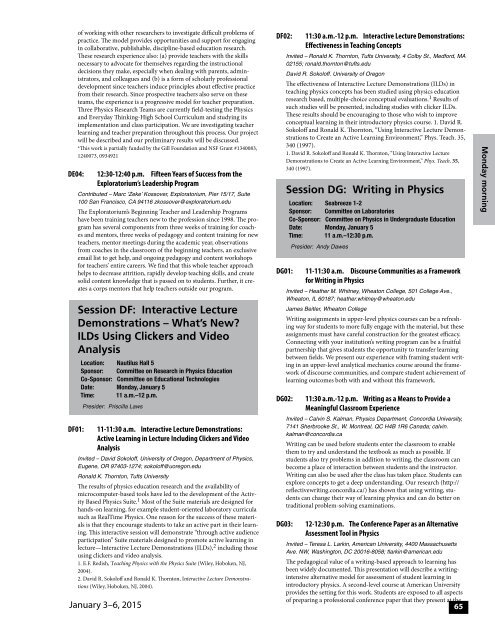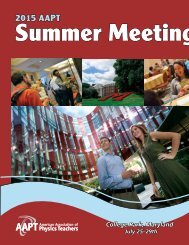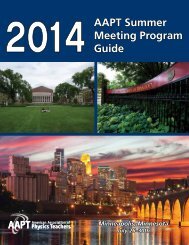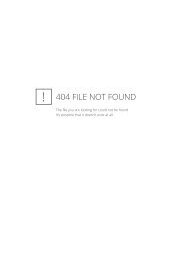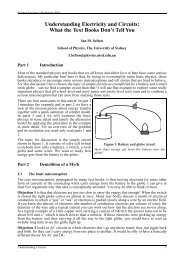final-program-12-23-14-3
final-program-12-23-14-3
final-program-12-23-14-3
Create successful ePaper yourself
Turn your PDF publications into a flip-book with our unique Google optimized e-Paper software.
of working with other researchers to investigate difficult problems of<br />
practice. The model provides opportunities and support for engaging<br />
in collaborative, publishable, discipline-based education research.<br />
These research experience also: (a) provide teachers with the skills<br />
necessary to advocate for themselves regarding the instructional<br />
decisions they make, especially when dealing with parents, administrators,<br />
and colleagues and (b) is a form of scholarly professional<br />
development since teachers induce principles about effective practice<br />
from their research. Since prospective teachers also serve on these<br />
teams, the experience is a progressive model for teacher preparation.<br />
Three Physics Research Teams are currently field-testing the Physics<br />
and Everyday Thinking-High School Curriculum and studying its<br />
implementation and class participation. We are investigating teacher<br />
learning and teacher preparation throughout this process. Our project<br />
will be described and our preliminary results will be discussed.<br />
*This work is partially funded by the Gill Foundation and NSF Grant #1340083,<br />
<strong>12</strong>40073, 0934921<br />
DE04: <strong>12</strong>:30-<strong>12</strong>:40 p.m. Fifteen Years of Success from the<br />
Exploratorium’s Leadership Program<br />
Contributed – Marc ‘Zeke’ Kossover, Exploratorium, Pier 15/17, Suite<br />
100 San Francisco, CA 94116 zkossover@exploratorium.edu<br />
The Exploratorium’s Beginning Teacher and Leadership Programs<br />
have been training teachers new to the profession since 1998. The <strong>program</strong><br />
has several components from three weeks of training for coaches<br />
and mentors, three weeks of pedagogy and content training for new<br />
teachers, mentor meetings during the academic year, observations<br />
from coaches in the classroom of the beginning teachers, an exclusive<br />
email list to get help, and ongoing pedagogy and content workshops<br />
for teachers’ entire careers. We find that this whole teacher approach<br />
helps to decrease attrition, rapidly develop teaching skills, and create<br />
solid content knowledge that is passed on to students. Further, it creates<br />
a corps mentors that help teachers outside our <strong>program</strong>.<br />
Session DF: Interactive Lecture<br />
Demonstrations – What’s New<br />
ILDs Using Clickers and Video<br />
Analysis<br />
Location: Nautilus Hall 5<br />
Sponsor: Committee on Research in Physics Education<br />
Co-Sponsor: Committee on Educational Technologies<br />
Date: Monday, January 5<br />
Time: 11 a.m.–<strong>12</strong> p.m.<br />
Presider: Priscilla Laws<br />
DF01: 11-11:30 a.m. Interactive Lecture Demonstrations:<br />
Active Learning in Lecture Including Clickers and Video<br />
Analysis<br />
Invited – David Sokoloff, University of Oregon, Department of Physics,<br />
Eugene, OR 97403-<strong>12</strong>74; sokoloff@uoregon.edu<br />
Ronald K. Thornton, Tufts University<br />
The results of physics education research and the availability of<br />
microcomputer-based tools have led to the development of the Activity<br />
Based Physics Suite. 1 Most of the Suite materials are designed for<br />
hands-on learning, for example student-oriented laboratory curricula<br />
such as RealTime Physics. One reason for the success of these materials<br />
is that they encourage students to take an active part in their learning.<br />
This interactive session will demonstrate “through active audience<br />
participation” Suite materials designed to promote active learning in<br />
lecture—Interactive Lecture Demonstrations (ILDs), 2 including those<br />
using clickers and video analysis.<br />
1. E.F. Redish, Teaching Physics with the Physics Suite (Wiley, Hoboken, NJ,<br />
2004).<br />
2. David R. Sokoloff and Ronald K. Thornton, Interactive Lecture Demonstrations<br />
(Wiley, Hoboken, NJ, 2004).<br />
January 3–6, 2015<br />
DF02:<br />
11:30 a.m.-<strong>12</strong> p.m. Interactive Lecture Demonstrations:<br />
Effectiveness in Teaching Concepts<br />
Invited – Ronald K. Thornton, Tufts University, 4 Colby St., Medford, MA<br />
02155; ronald.thornton@tufts.edu<br />
David R. Sokoloff. University of Oregon<br />
The effectiveness of Interactive Lecture Demonstrations (ILDs) in<br />
teaching physics concepts has been studied using physics education<br />
research based, multiple-choice conceptual evaluations. 1 Results of<br />
such studies will be presented, including studies with clicker ILDs.<br />
These results should be encouraging to those who wish to improve<br />
conceptual learning in their introductory physics course. 1. David R.<br />
Sokoloff and Ronald K. Thornton, “Using Interactive Lecture Demonstrations<br />
to Create an Active Learning Environment,” Phys. Teach. 35,<br />
340 (1997).<br />
1. David R. Sokoloff and Ronald K. Thornton, “Using Interactive Lecture<br />
Demonstrations to Create an Active Learning Environment,” Phys. Teach. 35,<br />
340 (1997).<br />
Session DG: Writing in Physics<br />
Location: Seabreeze 1-2<br />
Sponsor: Committee on Laboratories<br />
Co-Sponsor: Committee on Physics in Undergraduate Education<br />
Date: Monday, January 5<br />
Time: 11 a.m.–<strong>12</strong>:30 p.m.<br />
Presider: Andy Dawes<br />
DG01: 11-11:30 a.m. Discourse Communities as a Framework<br />
for Writing in Physics<br />
Invited – Heather M. Whitney, Wheaton College, 501 College Ave.,<br />
Wheaton, IL 60187; heather.whitney@wheaton.edu<br />
James Beitler, Wheaton College<br />
Writing assignments in upper-level physics courses can be a refreshing<br />
way for students to more fully engage with the material, but these<br />
assignments must have careful construction for the greatest efficacy.<br />
Connecting with your institution’s writing <strong>program</strong> can be a fruitful<br />
partnership that gives students the opportunity to transfer learning<br />
between fields. We present our experience with framing student writing<br />
in an upper-level analytical mechanics course around the framework<br />
of discourse communities, and compare student achievement of<br />
learning outcomes both with and without this framework.<br />
DG02:<br />
11:30 a.m.-<strong>12</strong> p.m. Writing as a Means to Provide a<br />
Meaningful Classroom Experience<br />
Invited – Calvin S. Kalman, Physics Department, Concordia University,<br />
7<strong>14</strong>1 Sherbrooke St., W. Montreal, QC H4B 1R6 Canada; calvin.<br />
kalman@concordia.ca<br />
Writing can be used before students enter the classroom to enable<br />
them to try and understand the textbook as much as possible. If<br />
students also try problems in addition to writing, the classroom can<br />
become a place of interaction between students and the instructor.<br />
Writing can also be used after the class has taken place. Students can<br />
explore concepts to get a deep understanding. Our research (http://<br />
reflectivewriting.concordia.ca/) has shown that using writing, students<br />
can change their way of learning physics and can do better on<br />
traditional problem-solving examinations.<br />
DG03:<br />
<strong>12</strong>-<strong>12</strong>:30 p.m. The Conference Paper as an Alternative<br />
Assessment Tool in Physics<br />
Invited – Teresa L. Larkin, American University, 4400 Massachusetts<br />
Ave. NW, Washington, DC 20016-8058; tlarkin@american.edu<br />
The pedagogical value of a writing-based approach to learning has<br />
been widely documented. This presentation will describe a writingintensive<br />
alternative model for assessment of student learning in<br />
introductory physics. A second-level course at American University<br />
provides the setting for this work. Students are exposed to all aspects<br />
of preparing a professional conference paper that they present at the<br />
65<br />
Monday morning


